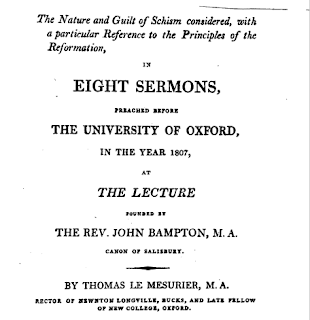'This strange imposition': Le Mesurier's Bampton Lectures and a necessary critique of the stigmata legend

In the sixth of his 1807 Bampton Lectures, On the Nature and Guilt of Schism , Le Mesurier continues with his characteristic Old High critique of excessive, radical asceticism. As mentioned last week, I think we can say that he here captures an enduring - and wise - aspect of ordinary Anglican piety: a mistrust and rejection of a radical asceticism which too easily and too readily denies the goodness of the created order and of the ordinary circumstances in which the vast majority of Christians are called to live out the faith: As to voluntary mortifications, or any self-denial more than is necessary to keep down our lusts and inordinate appetites, and for the due exercise of charity; and except in such extraordinary cases as occurred in the first ages, and in some subsequent periods of persecution, and as it is not impossible though improbable may yet recur, in all which God makes a special call upon us; beyond this I will venture to say that there is no warrant in Scripture for such ...








